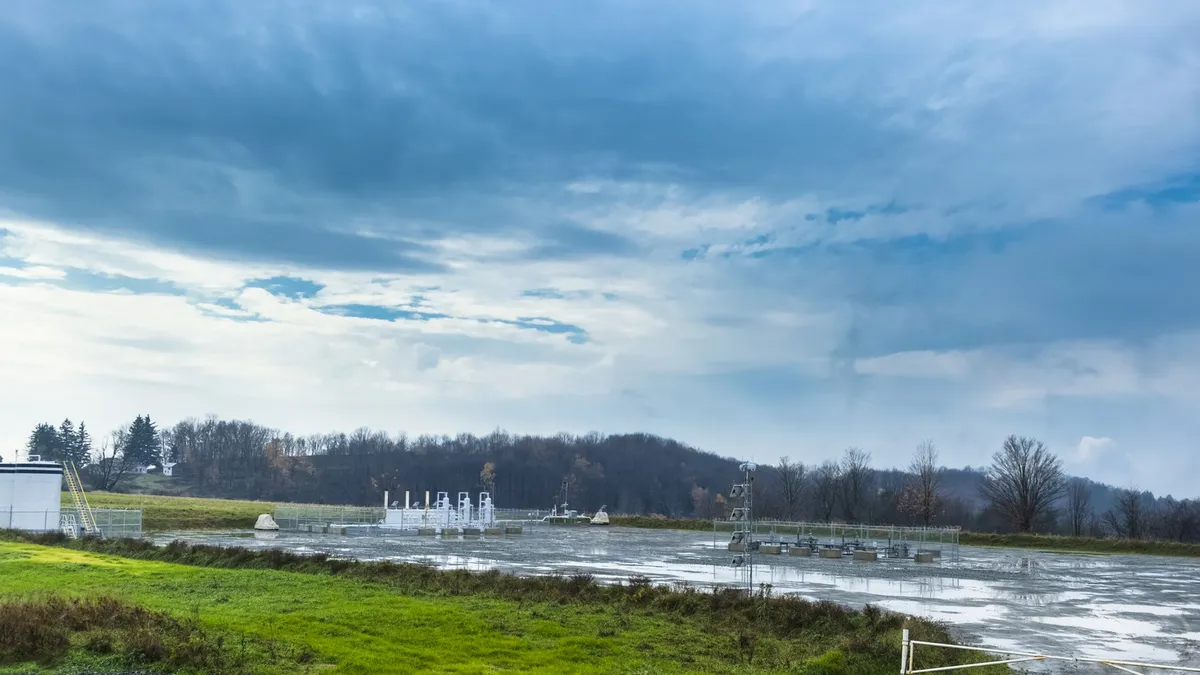Legislative hearings on the weather events that nearly ground Texas' grid to a total stop last week began in earnest Thursday, with retail generators, the grid operator and the state's utility commission all testifying before Texas Senate and House committees.
Both chambers are controlled by Republicans, but lawmakers on both sides of the aisle pressed those in charge of Texas' power grid on whether the market model itself was to blame, where better oversight could occur, and how to prevent such events in the future. They also took issue across the board with how utilities, regulators and the grid operator communicated with Texas ratepayers over the course of days-long outages that plagued the state last week.
"It wasn't one thing that went wrong that led to this plane crash. It was lots of things that went wrong that are all interconnected," said Rep. Eddie Lucio, D, during the hearings. "But the low hanging fruit, gentlemen, the low hanging fruit that could have really impacted the general public, was straightforward, transparent communication about the situation that they were encountering."
"Everyone is asking: Why, when Texans needed electricity the most, they were left in the dark and in the cold to fend for themselves?"

Abel Herrero.
Vice Chair, House Energy Resources Committee
Representatives relayed stories of their constituents who were impacted by the outages: A young boy who, after playing in the snow, shivered to death in his bed after the heat went out; an eight-year-old girl "fighting for her life," who relied on medical equipment to live; and numerous stories of people in nursing homes or with severe medical conditions struggling, and in some cases dying, due to the outages.
"This is why we are here to answer why, in a state that prides itself in being the biggest and best, we couldn't even keep a young boy warm," said Vice Chair of the House Energy Resources Committee Abel Herrero, D. "Everyone is asking: Why, when Texans needed electricity the most, they were left in the dark and in the cold to fend for themselves?"
Energy providers blamed most strongly the lack of coordination between gas and electric companies, saying in particular that supply constraints on the gas side were the biggest issue that brought the grid near collapse. They also questioned whether the current Electric Reliability Council of Texas (ERCOT) model was still prudent, and whether stronger winterization measures should be taken.
On the Senate side, meanwhile, questions of authority seemed to remain unresolved between ERCOT and the Public Utility Commission of Texas (PUCT), with representatives of both shifting responsibility for who had authority over what to the other.
'The big story' was the failure of gas
Retail generators largely confirmed what previous reports had found: While all resources struggled during the record-breaking cold snap, gas constraints were the main issue that caused supply and demand to fall dangerously out of balance. And the issues were weighted more toward the supply side than the generator side, Vistra Energy CEO Curtis Morgan testified.
"This was certainly, to some extent, the performance of generators," he said. "But the big story here ... was the failure of the gas system to perform. ... We do not have an integrated and seamless gas and power system. And if we don't have a seamless gas and electric power system, what happened last week will happen again."
More than one-fourth of U.S. natural gas reserves lie in Texas, and the state leads in natural gas production and consumption — 15% of natural gas consumed by electricity generation in the U.S. came from Texas in 2019, according to the U.S. Energy Information Administration.
The majority of ERCOT's winter peaking capacity relies on natural gas-fired power, and in total gas makes up 47.45% of the grid operator's generation footprint. At its peak, 52,277 MW of the grid operator's 107,514 MW in installed capacity fell offline or was forced off due to extreme weather conditions — over 25,000 MW of gas, around 18,000 MW of wind and just over 5,000 MW of coal, according to data released by ERCOT earlier this week.
Wind issues were caused by frozen turbines, and coal by frozen supply and delivery delays, said Morgan, but by far the greatest constraint from the generators' perspective was a lack of gas supply — frozen wellheads, lost electricity at processing plants, and frozen pipelines all contributed to the inability of generators to operate.
"I see the biggest gain that we could have got out of this whole thing is ... if we could have delivered gas," said Morgan. "And we have one of the largest gas fleets in Texas. So we saw this firsthand."
But Morgan and NRG Energy CEO Mauricio Gutierrez also agreed that other issues should be more closely examined as well, including ERCOT's market structure and greater winterization of generation facilities.
Restructuring? Winterization? Maybe both
ERCOT's market structure has been under fire by federal and state officials since last week, given its unique position on the U.S. power grid.
Texas' grid is separated from the rest of the U.S., operating under its own interconnection and without a mandatory capacity market. Instead, generators are incentivized to remain online for extra capacity through scarcity pricing.
But after scarcity pricing hit its cap last week, at $9,000/MWh, sending ratepayers bills skyrocketing and possibly forcing some generators to take big losses, lawmakers questioned whether the model was still prudent.
"We can get no new thermal baseload to come online, unless we have extreme weather events that juice up costs," said Rep. Rafael Anchía, D. "That's kind of a perverse outcome, don't you think?"
Morgan said the high scarcity pricing, which was recently raised in order to generate more revenues in the market, had created a more "volatile market of highs and lows," which in turn, he fears, will turn investors off the market.
"I was a big proponent of this market, and my faith has been shaken. ... And so I think we've got to look at something, in my opinion, that's more stable than this. This just is not befitting of the state of Texas."

Curtis Morgan
CEO, Vistra
"In my mind, we're at a crossroads," he said. "And my own view is that we need to figure out how to continue to evolve the competitive market."
The Federal Energy Regulatory Commission has opened its own investigation into whether there were any instances of market manipulation, though its jurisdiction over ERCOT is limited. FERC Chair Richard Glick has also called on Congress and the state to take a hard look at the market design, including its "go it alone" interconnection approach and lack of capacity market.
Vistra's Morgan seemed to agree that potentially drastic measures should be taken, calling the events of last week "completely unacceptable."
"I was a big proponent of this market, and my faith has been shaken," he said.
"And so I think we've got to look at something, in my opinion, that's more stable than this. This just is not befitting of the state of Texas."
Meanwhile, on weatherization and winterization, NRG's Gutierrez said, there were certainly steps generators could take, and steps his company will take, to harden against more severe weather conditions.
"There were things that should not have been impacted by the cold weather," he said. "There are things that we have never seen happen in our power plants." He said the company would use this year's extreme temperatures as the new benchmark for what NRG's system should be prepared for, and how it approaches winterization.
Such a consideration may seem straightforward, but is more complicated, stakeholders have said, because to some extent generators are likely to be reluctant to invest in preparing for cold weather events and, for example, potentially risking summer efficiency or raising ratepayer costs unnecessarily.
Tensions between ERCOT and the PUCT
ERCOT has taken much of the blame for its management of the outages. Gov. Greg Abbott, R, ordered the legislature to investigate the grid operator specifically last week, and called their handling of the situation "unacceptable." After five board members resigned earlier this week, he said he welcomed the departures, adding that ERCOT had "failed to do its job."
Rep. Anchía told Vistra and NRG at one point that he believed too much of the blame was being placed on ERCOT, and not enough on Abbott's administration and the PUCT.
"I've been very interested since the advent of the storm that there's been this very carefully curated discussion of blame by the governor that always speaks to ERCOT ... and never mentions the Public Utility Commission," said Rep. Anchía.
ERCOT seemed to agree. But PUCT Chair DeAnn Walker told the Senate she believed her authority and the authority of her commission was overstated.
"There's a lot of things [ERCOT CEO Bill Magness] said about our authority over them that I simply disagree that that's how it's actually playing out in real life," she said. "Listening to Mr. Magness, you would think that we exercise a great amount of detail of authority."
"You're the chair of the Public Utility Commission. So I would contend that it's not a problem with authority. I would contend that you are choosing not to leverage the authority we've given you. And that's a serious, serious problem."

Brandon Creighton
Republican Senator
The PUCT's main authority comes from its budgeting and approval of its board members, according to Walker. They have no authority over how the board is organized or how ERCOT operates its load, she said.
"That is why we have them ... for that expertise," she said.
Senators seemed frustrated by the conflicting accounts, and challenged Walker's characterization of her role and of the PUCT's.
Under the Public Utility Regulatory Act, the PUCT has "complete control over ERCOT," said Sen. Brandon Creighton, R, and he said it seems like the PUCT is simply not using or understanding that power.
"You're the chair of the Public Utility Commission," he said. "So I would contend that it's not a problem with authority. I would contend that you are choosing not to leverage the authority we've given you. And that's a serious, serious problem."























